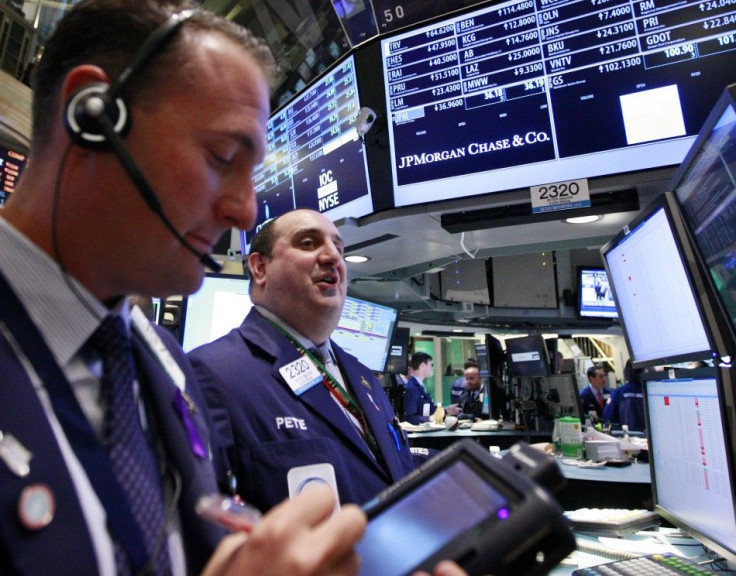Stock Trading Suffers On Uncertain, Unpredictable Markets
Out-of-control technology cuts NYSE composite volume to 2007 level

The lights are on at 11 Wall Street, the home of the New York Stock Exchange, but if recent trading data is to be believed, it appears almost nobody is home.
Trading in U.S. stocks has been going on at a snail's pace recently, a fact market-watchers are blaming on uncertainty regarding euro zone policy as much of Europe's leadership being on vacation and the lack of direction from the Federal Reserve ahead of a widely anticipated summit later this month.
But not all the collapse in trading volume can be linked to what the Wall Street Journal described as "traders and hedge-fund managers escaping to their vacation homes in the Hamptons."
In the wake of a string of confidence-killing mishaps related to equites trading -- the most notable being the manipulation of over 140 public issues by a trading algorithm gone berserk earlier in August -- some are also suggesting the shift to lower trading volumes might be more permanent: investors are simply not coming back to the Wild West of stock trading anytime soon.
Wednesday the number of shares traded on the New York Stock Exchange, which has averaged over 3.7 billion for the year, was 2.64 billion. It was the fourth straight day the exchange saw volume of less than 3 billion. NYSE composite volume is on track for its lowest month since December 2007, according to data from Dow Jones.
Other U.S. stock markets, including the automated Nasdaq board, are seeing similarly languid volumes. And benchmark equity indicators tracking the wider market have seen even bigger drops in volume. The SPDR S&P 500 ETF (NYSEARCA:SPY), nearly always the most traded isssue on the New York Stock Exchange, has seen less than 100 million shares change hands on seven of the last nine sessions. A more regular volume is in excess of 150 million shares.
Calling the action in the markets Wednesday "metaboring," Goldman Sach's equity trading desk wrote in a note after the market had closed that "it's getting boring to make the comment that equities are again boring. Or maybe that's called boring-squared."
"Here's to hoping tomorrow is boring-cubed," the note added.
Lack of news from European and U.S. central bankers has been the go-to explanation for the low amount of trading. But as the days of sleepy stock-broking continue to roll by, some are questioning if it's not also possible investors have just had it with the cut-throat, unpredictable nature of the exchanges and simply are leaving the markets altogether.
It makes sense if you think of the news that has dominated the market headlines of late.
Larry Tabb who, as CEO of market technology information company Tabb Group, is no enemy of technology enhanced trading, recently asked in a trade magazine article if "given the problems with the Flash Crash, Facebook and now Knight, have our market become too fragile?"
"Has the technology surpassed our management capabilities? Have the regulators been left in the dust and investors on the sidelines?" he added, later stating that "these systemic problems hurt investor confidence and trust."
Ironically -- or predictably, depending on who you ask -- the drop in volume due to a lack of investor confidence is creating a chicken-and-egg dynamic that is further depressing confidence in the market. With the drop in the rate of trading, for example, a widely followed measure of volatility in the stock market, the CBOE VIX Index, has fallen to low levels not seen in over five years. That does not mean there is little volatility to come but, since the index is calculated by the spread in prices from stock options -- options that are not getting traded -- likely shows the index is broken.
Investors don't even trust quoted prices, given they are "floating" on low turnaround and might suffer a sharp reversal if and when volume comes back into the market.
"If you're pessimistic and wonder how long the rally can continue, the fact that [volume] has been anemic is another reason to be cautious," Michael Sheldon, chief market strategist at RDM Financial Group, told the Wall Street Journal. "Investors are uncertain as to whether they should chase the market higher."
As for a solution to the issue, consider Larry Tabb's advice:
"Given the events of the past six months, the SEC should think hard about the market structure it has created, and do its utmost to rein it in," he wrote, adding that "until we can safely manage complex and massive message streams in microseconds, fragmentation is making one of the greatest financial markets of all time about as stable as a McLaren with its RPMs buried in the red."
© Copyright IBTimes 2024. All rights reserved.





















